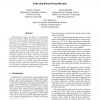Free Online Productivity Tools
i2Speak
i2Symbol
i2OCR
iTex2Img
iWeb2Print
iWeb2Shot
i2Type
iPdf2Split
iPdf2Merge
i2Bopomofo
i2Arabic
i2Style
i2Image
i2PDF
iLatex2Rtf
Sci2ools
139
click to vote
CSFW
2004
IEEE
2004
IEEE
Enforcing Robust Declassification
Noninterference requires that there is no information flow from sensitive to public data in a given system. However, many systems perform intentional release of sensitive information as part of their correct functioning and therefore violate noninterference. To control information flow while permitting intentional information release, some systems have a downgrading or declassification mechanism. A major danger of such a mechanism is that it may cause unintentional information release. This paper shows that a robustness property can be used to characterize programs in which declassification mechanisms cannot be exploited by attackers to release more information than intended. It describes a simple way to provably enforce this robustness property through a type-based compile-time program analysis. The paper also presents a generalization of robustness that supports upgrading (endorsing) data integrity.
CSFW 2004 | Declassification Mechanisms | Information Flow | Information Release | Security Privacy |
Related Content
| Added | 20 Aug 2010 |
| Updated | 20 Aug 2010 |
| Type | Conference |
| Year | 2004 |
| Where | CSFW |
| Authors | Andrew C. Myers, Andrei Sabelfeld, Steve Zdancewic |
Comments (0)

